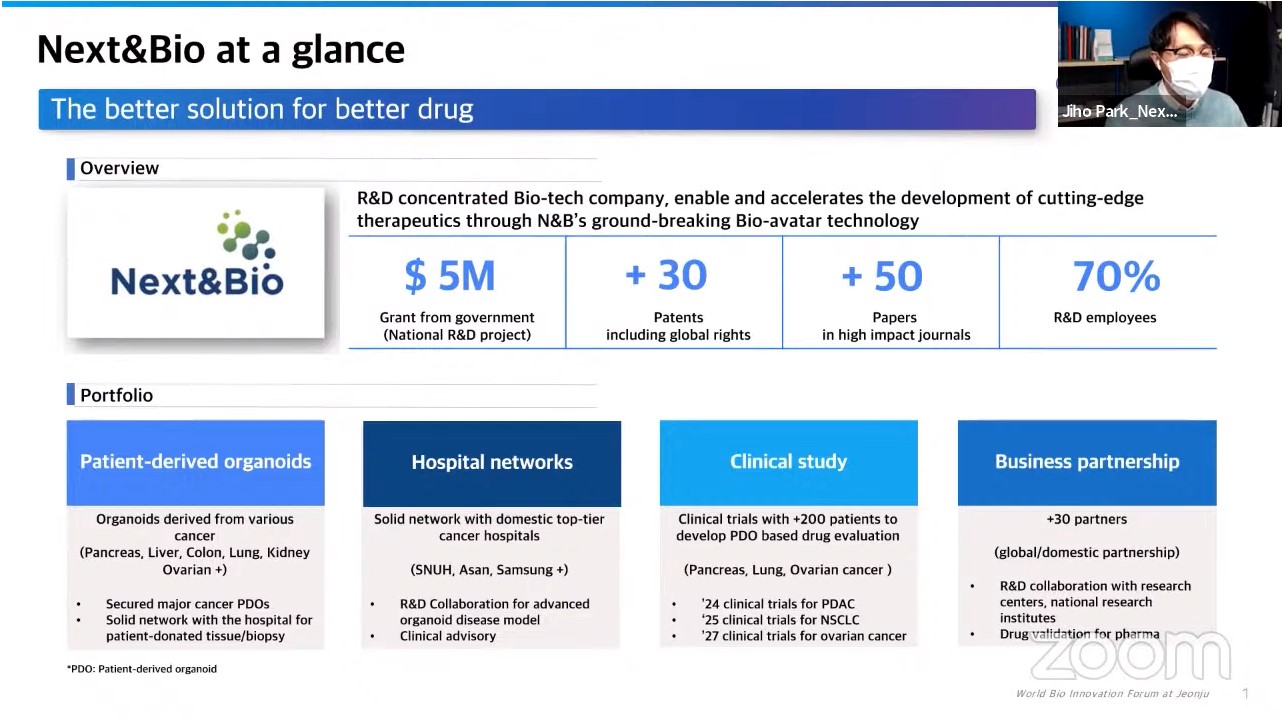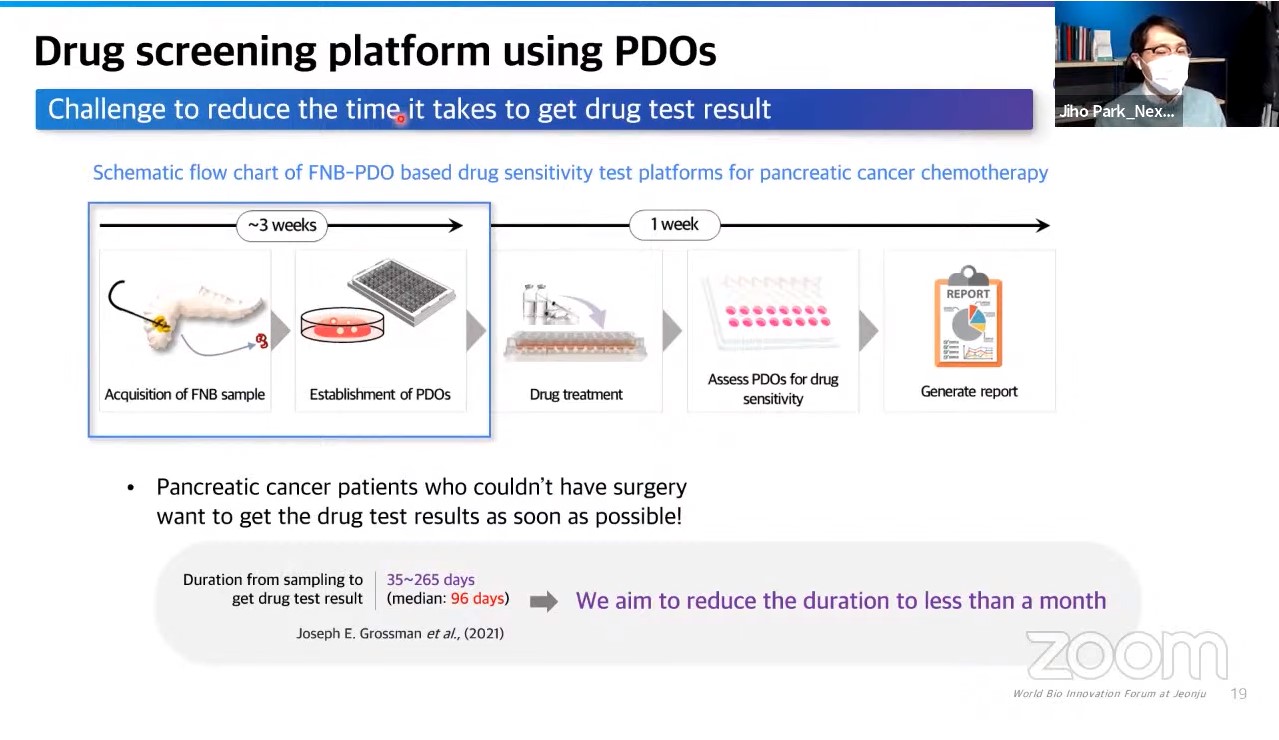ISSUES
The Application of Organoid-based Platforms to Personalized Pancreatic Cancer Treatment by Dr. Jiho Park
(Stem Cell Therapy & Organoids Session 2)
The Application of Organoid-based Platforms to Personalized Pancreatic Cancer Treatment
Jiho Park_Director of Clinical Research Department, NEXT&BIO
Dr. Jiho Park briefly introduced NEXT&BIO which is a company known in doing organoid and a company that develops pre-season medicine technology with an R&D concentrate biotech company founded in 2018. From the beginning NEXT&BIO has been developing organoid-based drug screening platform to provide the best solution to hospitals and major pharmaceutical companies. NEXT&BIO consists of more than 70 R&D members and with their contribution, they have made a lot of papers and lots of patents as well as several advancements in technology. NEXT&BIO received the grant of about five million dollars from the government to carry out the national R&D project. The company have set up the network of many major hospitals and biobank or patient derived organoids. NEXT&BIO prepared the clinical trial for organoid-based drug testing platform with a pancreatic cancer patient and it will be initiated in 2023. NEXT&BIO special attention is on the early stage of drug development which cost billions of dollars over the decade with a very low success rate. NEXT&BIO came up with a distinguished organoid platform as a bio-avatar which has huge potential to lower the barrier to pass the clinical trial. NEXT&BIO’s platform will support the drug development by providing the clue of the efficiency of candidates and pharmaceutical companies are expected to decrease the development costs and reduce development time.
Image Sources: Zoom Presentation Screenshot by Dr. Jiho Park
In 2022, NEXT&BIO has secured approximately 100 organoids from various organs with a complete mutation profile and the company plan to secure approximately 10,000 organoids in 2024. NEXT&BIO is ready to find the etiquette organized for R&D Partners. Dr. Park discussed the importance of organoids for precision medicine or pancreatic cancer. Dr. Park elaborated deeply into the pancreatic cancer known to be a cancer with a high mortality rate and one of the deadliest cancers and notorious for its poor prognosis with only 11 percent of five of survival rates. He then continued with reasons of poor prognosis of pancreatic cancer, related to no distinctive symptoms, only diagnosis is very difficult which doesn’t have detection tools, scans, or blood tests. Also, the lack of applicable biomarkers for diagnosis or the contributed to late detection or pancreatic cancer and this is high mortality rate. Recently immunotherapy has been in the spotlight but unfortunately pancreatic cancer has been reported to not work well. Dr. Park explained that in Korea, like other developed countries or the incidence of pancreatic cancer patient has been gradually increasing. Many studies have shown that the mortality rate of concrete cancer patients in Korea is expected to increase gradually in the future. Dr. Park continued with the treatment option for pancreatic cancer in which unfortunately surgery is the only way to cure pancreatic cancer. Dr. Park elaborated that in the recent years, the rate of surgery is increasing through the strategies of performing surgery after reducing the size of the tumor by preceding the chemotherapy. Dr. Park emphasized that the fact that only 20 percent of patients can have a surgery is very important for researchers if the subject of the study is limited to the pancreatic cancer surgery samples.
Image Sources: Zoom Presentation Screenshot by Dr. Jiho Park
Dr. Park then elaborated pancreatic cancer patients with the use of algorithm chart for concrete cancer treatment. He explained that most patients will receive chemotherapy if surgery is not the first option. In the absence of a very specific targeted drug or immune checkpoint innovator for pancreatic cancer, cytotoxic chemotherapy is only for the most pancreatic cancer patients. After chemotherapy, the fiber survivor rate slightly increased but are still low. Dr. Park explained that effective new drug must be developed quickly for pancreatic cancer since there is no way to treat pancreatic cancer at the current stage except for developing a specific new drug. He continued to mention that currently two combination drugs are used as a first-line treatment for pancreatic cancer. These drugs are FOLFIRINOX and the other is same seven plus nepocritaxel. The problem is there is no conclusion as to which of the two drug is more effective. In other words, there are currently no clear criteria for the drug selection. Due to this inconclusiveness, NETXT&BIO developed a drug testing platform for pancreatic cancer patient which model should be selected and built for drug selection. Dr. Park showed some schematic diagram with the basic concept of a tumor taken out from the patient and test for reactivity. For the results, NEXT&BIO wanted the application of organoid as a model for the drug sensitive sensitivity test. Currently, NEXT&BIO is conducting the retrospective clinic or R&D from multiple hospitals with this technology. NEXT&BIO have planned to start a prospective clinical trial in 2023. The biggest challenge that NEXT&BIO is currently facing is shortening the primary culture period. I think there are no pancreatic cancer patients who want to wait a long time for the drug treatment. Therefore, for the platform to succeed, drug sensitivity test result must be generally generated and delivered as quickly as possible. Shortening the primary culture period in the FMB samples is not easy because it has an absolutely insufficient amount of tumor cells but tumor cells. Research study showed that the median duration of establishing as FMB drive organoid to generate reported is about three months. NETX&BIO want to shorten that period to about one month. Currently, conducting the retrospective R&D on concrete cancer patients was also presented and with the result, the establishing organoid from colorectal cancer patient and testing the sensitivity to two types of drugs. Currently, the clinical outcomes of patients are being followed up. Finding the clinical relevance with outcomes. The new and effective targeted anti-cancer drugs and groundbreaking immunotherapy are NEXT&BIO’s new weapons in the fight against cancer. However, cytotoxic anti-cancer drugs are still being used for some cancers and some cold in the absence of the clear criterion for drug selection. Some cancer patients start chemotherapy wasting the raising the opportunity for the treatment that will never come again. NEXT&BIO’s platform can be effectively used in cases where drug selection is essential. Dr. Park ended his talk introducing their partners, under the license from organoid and research related to pancreatic cancer. The program in progress with NEXT&BIO is with the Seoul National University from the Bundang Hospital.

